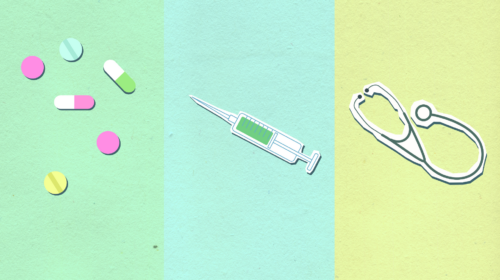Vivitrol works by blocking the effects of opioids and alcohol. It’s a non-habit-forming substance and shows promise as a short-term treatment for opioid or alcohol use disorder following withdrawal.
Key Points:
- Vivitrol blocks the effects of opioids and alcohol.
- After detox, you can begin taking Vivitrol.
- While Vivitrol manages cravings short term, it is unclear if it helps manage cravings in the long term.
What is Vivitrol?
Vivitrol is an injectable-extended-release version of the drug naltrexone. Naltrexone is a non-habit-forming antagonist that blocks opioid and alcohol users from experiencing both euphoria and addiction as a result of drug usage.[1]
Vivitrol is injected into the gluteal muscles and continuously released over the course of a month. It cannot be injected any other way (i.e., intravenously, subcutaneously, or into fat tissue) and must be used with a customized needle.[2] It is imperative that a licensed physician be the person to administer Vivitrol.
It should only be administered 7-10 days after alcohol/opioid withdrawal. It is not a replacement for detoxification. Detoxification must be fully complete before Vivitrol can begin. To date, there are no hard guidelines on how long Vivitrol treatment can last.[3]
Injected monthly Vivitrol (380mg) exposure is 3-4x higher than the total daily dosing of naltrexone (50mg) over a comparable 4-week period.[4]
Mechanism of Action
Vivitrol for opioid use disorder (OUD) blocks opioid metabolites from binding to the opioid receptors in the central nervous system. Like OUD, Vivitrol for alcohol use disorder (AUD) blocks ethanol metabolites from binding to the opioid receptors in the central nervous system.
Vivitrol is a strong antagonist of mu-opioid receptors and a weak antagonist of kappa and delta-opioid receptors.[5][6] It also modifies the hypothalamic-pituitary-adrenal axis to suppress the urge to drink alcohol.[7]
A single, deep injection of Vivitrol will last 4 weeks. Within 2 hours, peak naltrexone blood plasma concentration occurs.[8] For about 2 weeks, these concentrations will hold steady. During this time, the patient will not be able to feel the effects of opioids or alcohol. Therefore the desire to use or obtain this substance will decrease.
To date, the only accepted medical usage of Vivitrol is to treat the cravings associated with alcohol and opioid use disorder.
Effectiveness of Vivitrol
Does Vivitrol work? Yes, but only for as long as you are taking it. During the 4 weeks of elevated naltrexone blood plasma concentration, the patient will not be able to experience the euphoric effects of opioids and alcohol. It is during this time that additional treatments will be applied to the patient to break the cycle of addiction.
In a clinical study, equal numbers of patients with a history of opioid dependence were assigned to an extended-release naltrexone (Vivitrol) treatment group and to a control treatment group with the usual counseling and community programs.
The short-term Vivitrol success rate is high. During the 24-week treatment phase, the levels of opioid-negative urine samples were higher for the Vivitrol (74%) than for the control (56%).[9] But, in a 78-week follow-up, the rates of opioid-negative urine samples were roughly the same for each group (approx. 46%).[10]
It appears that Vivitrol is helpful for managing addiction while it is in the patient’s system, but once it is eliminated, it does not change the trajectory of long-term addictive behavior in a statistically significant way.
While it is helpful to administer Vivitrol to manage cravings for a short term to recovering patients with OUD and AUD, the long-term success of the drug in managing cravings is less clear. More research remains to be done on the subject.
Addiction Treatment
Substance addiction can have serious–and fatal–consequences. If you are addicted to a substance, seek treatment immediately. There are licensed and accredited treatment centers near you that want to help you craft a recovery plan. If you would like to assess whether Vivitrol is the right treatment for you, speak to your treatment team about your plan for recovery following detox.
Vivitrol is a prescription medication. Medication-Assisted Therapy (MAT) is a powerful tool in the addiction therapy toolkit when also used in conjunction with more traditional cognitive behavioral therapies (CBT). Having dual treatments such as MAT and CBT helps the patient achieve success.
Recovery Unplugged is ready to answer your questions about a Vivitrol treatment. We are an addiction treatment center that uses music to promote wholeness and healing, along with more traditional therapies such as MAT and CBT. All our members get an individualized treatment plan to help them achieve sobriety.
Frequently Asked Questions about Vivitrol
Can you drink on Vivitrol?
No, you shouldn’t drink or binge drink alcohol while on Vivitrol.
Vivitrol works by blocking the euphoric effects of alcohol consumption. It binds to the mu-opioid receptors in your brain, which prevents alcohol’s metabolites from doing the same. You can still get drunk, but it just won’t have the same immediate effects.
While you won’t experience the euphoric effects of alcohol as it pertains to dopamine production, alcohol will still have effects on the rest of your central nervous system. Alcohol is a toxin that must be cleaned out of your body by your liver. Even though you can’t feel the euphoric effects, the depressant alcohol still blocks chemical signals between neurons in your central nervous system.
What happens if you drink on Vivitrol?
Vivitrol is meant to break the learned association of guaranteed pleasure with drinking behavior. If you have struggled with alcohol addiction, you must make the decision for yourself about what you can handle and what is safe for you.
Just because you can’t feel the pleasure of consuming alcohol does not mean the rest of the effects of alcohol are also magically canceled out.
All the effects of binge drinking alcohol still apply, but just without euphoria:
- Impulsive behavior
- Loss of coordination
- Nausea
- Vomiting
- Slurred speech
- Dehydration
What is a Vivitrol shot?
A Vivitrol shot is a 380 mg injection into the gluteal muscles. It reaches peak concentration in a few hours and remains constant for 14 days. It tapers off over the next 14 days and is eliminated within a month from the date of injection.
Who makes Vivitrol?
Vivitrol is made by Alkermes, a global pharmaceutical company behind several other prescription medications, like ARISTADA and LYBALVI.
Sources:
- [1][2][3] Ndegwa, S., Pant, S., Pohar, S., & Mierzwinski-Urban, M. (n.d.). Injectable Extended-Release Naltrexone to Treat Opioid Use Disorder. National Institutes of Health. https://www.ncbi.nlm.nih.gov/books/NBK481477/
- [4][8] What is Vivitrol? vivitrol – a monthly extended-release injectable formulation of naltrexone. For Healthcare Professionals. (n.d.). https://www.vivitrolhcp.com/what-is-vivitrol-ad
- [5][6][7] Naltrexone – StatPearls – NCBI Bookshelf. (n.d.). https://www.ncbi.nlm.nih.gov/books/NBK534811/
- [9][10] Lee, J. D., Friedmann, P. D., Kinlock, T. W., Nunes, E. V., Boney, T. Y., Hoskinson, R. A., Wilson, D., McDonald, R., Rotrosen, J., Gourevitch, M. N., Gordon, M., Fishman, M., Chen, D. T., Bonnie, R. J., Cornish, J. W., Murphy, S. M., & O’Brien, C. P. (2016, March 31). Extended-release naltrexone to prevent opioid relapse in Criminal Justice offenders. The New England Journal of medicine. https://www.ncbi.nlm.nih.gov/pmc/articles/PMC5454800/

























